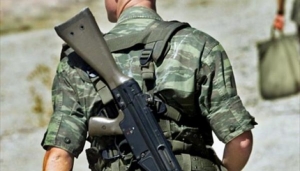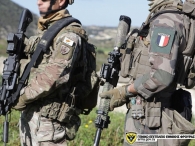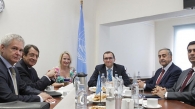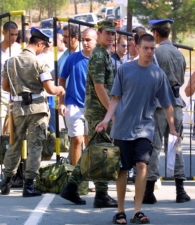Η αντιεπαγγελματική επαγγελματοποίηση
της Εθνικής Φρουράς
Του Στρατή Ευθυμίου
Τέως Σύμβουλος Υπουργείο Άμυνας
Το αποτέλεσμα, καθώς και η μέθοδος ημιεπαγγελματοποίησης του στρατού στην Κύπρο (Εθνική Φρουρά) εγείρουν αμφιβολίες.
Η μείωση της θητείας και η πρόσληψη επαγγελματιών στρατιωτών δεν αποτελεί μεμονωμένο γεγονός, αλλά μέρος της επαγγελματοποίησης ή ημιεπαγγελματοποίησης του στρατού. Αυτή η διαδικασία είναι σήμερα πολύ γνώριμη στις χώρες της Δύσης και ιδιαίτερα της Ευρωπαϊκής Ένωσης. Στην Κύπρο η θετική επίπτωση τόσο στους νέους άντρες όσο και στην οικονομία είναι βέβαια ουσιαστική, καθώς η μείωση της θητείας εξοικονομεί ουσιαστικό χρόνο από την νεολαία και προσθέτει ενεργό ανθρώπινο δυναμικό στην οικονομία. Η οικονομική όμως εξυγίανση αποτελεί δευτερεύοντα σκοπό της επαγγελματοποίησης των στρατιωτικών δυνάμεων, καθώς ο θεσμικός ρόλος κάθε στρατού ανά τον κόσμο είναι η διατήρηση της ακεραιότητας μιας χώρας. Είναι όμως, αυτός, ο στόχος της επαγγελματοποίησης στην Κύπρο;
Η επαγγελματοποίηση μέσα από συγκεκριμένα βήματα στοχεύει στο να καταστήσει τον στρατιωτικό θεσμό ισχυρότερο, επιτρέποντάς του να λειτουργεί πιο σταθερά και αποτελεσματικά, να γίνει μικρότερη και ενοποιημένη οντότητα λιγότερο κατακερματισμένη εξαιτίας κομματισμών και της παρείσφρησης ιδεολογιών, χειριζόμενη με περισσότερη αποτελεσματικότητα τους πόρους, τους οποίους αντλεί από το κράτος και την κοινωνία, βελτιώνοντας παράλληλα τη χρήση της σύγχρονης τεχνολογίας και των όπλων. Ένας επαγγελματικός, δηλαδή, στρατός —ακόμα και μόνο ημιεπαγγελματικός— είναι σαφώς μικρότερος, αρτιότερα εκπαιδευμένος, αυστηρότερα πειθαρχημένος και λιγότερο πολιτικοποιημένος.
Είναι ξεκάθαρο ότι η Εθνική Φρουρά δεν θα πετύχει κανέναν από τους παραπάνω στόχους μέσα από την διαδικασία που ακολουθείται. Ο πρόχειρος τρόπος με τον οποίο γίνεται η ημιεπαγγελματοποίηση της Εθνικής Φρουράς διαφαίνεται άμεσα από την έλλειψη στρατηγικής και πραγματικού σχεδιασμού πολιτικής.
Ποιο είναι το πλαίσιο της επαγγελματοποίησης των στρατευμάτων;
Η παραπάνω αναφορά στα βήματα επαγγελματοποίησης σχετίζεται με τα πολλά, δύσκολα και συγκεκριμένα βήματα τα οποία έχουν ήδη δοκιμαστεί από την επαγγελματοποίηση στρατευμάτων από τις περισσότερες χώρες της Δύσης. Παραδείγματος χάριν, η Ελλάδα έχει ημιεπαγγελματικό στρατό εδώ και δεκαετίες οδεύοντας προς πλήρη επαγγελματοποίηση, η οποία έχει μεταξύ άλλων επιβραδυνθεί λόγω της οικονομικής κρίσης. Η Σουηδία κατάργησε τη στρατιωτική θητεία μόλις το 2010, ούσα μία από τις τελευταίες χώρες της Ευρωπαϊκής Ένωσης η οποία διατηρούσε ακόμη το θεσμό της στρατιωτικής θητείας.
Ιδιαίτερα από την αρχή της δεκαετίας του 1990 επαγγελματικές, μικρότερες, ισχυρότερες και πιο αποδοτικές δυνάμεις έχουν σταδιακά αντικαταστήσει τους ογκώδεις κληρωτούς στρατούς (Burk, 1992; Haltiner, 1998). Οι περισσότερες χώρες του ΝΑΤΟ και της ΕΕ έχουν ήδη καταργήσει την υποχρεωτική στράτευση. Σήμερα, από τις 28 χώρες του ΝΑΤΟ μόνο 5 διατηρούν κάποια μορφή στρατιωτικής θητείας. Από τα 28 κράτη-μέλη της Ε.Ε. μόνο 6, συμπεριλαμβανομένης της Κύπρου, η οποία μέχρι πρότινος είχε τη μεγαλύτερη στρατιωτική υπηρεσία στην Ε.Ε. Τώρα όμως προβαίνει και σε μία από τις χειρότερες και πιο άδοξες επαγγελματοποιήσεις. Γράφτηκε στον Τύπο ότι «μια νέα εποχή ξεκινά για την Εθνική Φρουρά» (CyprusTimes, 2016). Το ότι είναι νέα δε σημαίνει όμως ότι είναι και θετική.
Παρόλη την πολιτική της κυβέρνησης να διαφημίσει τη μείωση της θητείας για λόγους εσωτερικής κατανάλωσης, η Εθνική Φρουρά δεν προσέλαβε πρώτη φορά επαγγελματίες στρατιώτες, καθώς η θητεία έχει μειωθεί πολλές φορές, έστω και λίγο. Η τρέχουσα διαδικασία φαίνεται ότι δεν είναι τίποτα περισσότερο παρά πρόχειρη ενέργεια πολιτικής σκοπιμότητας δεδομένου ότι δεν θα συντελέσει στην ουσιαστική ημιεπαγγελματοποίηση της Εθνικής Φρουράς. Καίριο ζήτημα των επαγγελματοποιήσεων είναι ότι κοστίζουν ακριβά. Η Ελλάδα χρειάστηκε να θέσει στο περιθώριο τη σκέψη της μείωσης ένεκα μεγάλων οικονομικών δυσχερειών που αντιμετωπίζει η χώρα και της φυγοστρατίας (Βλέπε Αριστοτέλους, 2016).
Η αντιεπαγγελματική επαγγελματοποίηση
Η υφιστάμενη επαγγελματοποίηση στην Κύπρο δεν ακολούθησε ούτε τα στοιχειώδη βήματα, δηλαδή, την:
· αναδιοργάνωση της Εθνικής Φρουράς,
· τη σμίκρυνση του στρατού σε μια πιο ευέλικτη, αποτελεσματική και οργανωμένη δύναμη,
· την εξασφάλιση νέων οπλικών και άλλων συστημάτων,
· καθώς και την αναβάθμιση της εφεδρείας.
Αν ρίξουμε μια κοντινή ματιά στο πότε, πώς και γιατί έγινε η μείωση της θητείας, αμέσως διαπιστώνουμε ότι έγινε λόγω της ανικανότητας της πολιτικής εξουσίας να αντιμετωπίσει τα χρόνια και πολλαπλά προβλήματα της Εθνικής Φρουράς, αλλά και για λόγους εσωτερικής κατανάλωσης.\
Σήμερα οι επαγγελματίες στρατιώτες διοχετεύονται σε ένα σύστημα το οποίο δημιούργησε τα προβλήματα που επιδιώκεται να επιλυθούν με την πρόσληψη επαγγελματιών, όπως —για να αναφέρουμε ενδεικτικά μόνο ορισμένα από αυτά— τη βαθιά διαφθορά, την ανεξέλεγκτη φυγοστρατία, την έλλειψη πολιτικού οράματος ως προς την άμυνα της Κύπρου (Efthymiou 2016). Η εφεδρεία, μάλιστα, βρίσκεται σε απελπιστική κατάσταση, γεγονός γνωστό σε όλους σχεδόν τους Κυπρίους, μεγάλος αριθμός των οποίων είναι έφεδροι. Η υφιστάμενη, δηλαδή, διαδικασία όχι μόνο δεν αναβαθμίζει την Εθνική Φρουρά, χωρίς να επιλύει τα προβλήματά της, αλλά και οξύνει τις χρόνιες παθογένειες διογκώνοντάς τες.
Είναι προφανές ότι η απόφαση ανακοινώθηκε διόλου τυχαία λίγο νωρίτερα από τις Βουλευτικές Εκλογές. Τα κόμματα της αντιπολίτευσης έκαναν λόγο για προεκλογικό πυροτέχνημα της Κυβέρνησης, ενώ κάποια διερωτήθηκαν γιατί παραγνωρίστηκαν τρία βασικά προαπαιτούμενα τα οποία έθετε η ίδια η κυβέρνηση για να προχωρήσει στη μείωση της στρατιωτικής θητείας: η αναδιοργάνωση, δηλαδή, της Εθνικής Φρουράς, η ενίσχυση των εξοπλιστικών προγραμμάτων και η πρόσληψη επαγγελματιών οπλιτών (Philenews, 2016). Όπως γράφτηκε κατά κόρον στον Τύπο εκείνη την περίοδο, η απόφαση εξαγγέλθηκε χωρίς να ενημερωθεί ο αρχηγός της Εθνικής Φρουράς (Reporter, 2016). Συγχρόνως, εγέρθηκαν βάσιμες αμφιβολίες σχετικά με το κατά πόσον η ισχύουσα διαδικασία θα ακολουθήσει το πολυετές σχέδιο που κατάρτισε το ΓΕΕΦ σχετικά με τα σταδιακά βήματα αναδιοργάνωσης και επαγγελματοποίησης. Παντελώς λανθασμένη χαρακτηρίζουν τη διαδικασία τρεις ανώτατοι απόστρατοι αξιωματικοί της Εθνικής Φρουράς, σημειώνοντας παράλληλα την ορθή –κατά τη γνώμη τους- διαδικασία που έπρεπε να εφαρμοστεί για να ανοίξει ο δρόμος για μείωση της θητείας (Philenews 2016a). Είναι, όμως, βέβαιο ότι η αναντίρρητη προϋπόθεση που έθεσαν οι στρατιωτικοί κύκλοι, να μειωθεί δηλαδή η στρατιωτική θητεία μετά την πρόσληψη των επαγγελματιών, δεν τηρήθηκε. Αυτή η προϋπόθεση ήταν καίριας σημασίας αφού τέθηκε για να προσληφθούν και να εκπαιδευτούν οι επαγγελματίες οπλίτες πριν μειωθεί η δύναμη της Εθνικής Φρουράς. Όμως έγινε το αντίθετο· μειώθηκε η δύναμη, ενώ οι επαγγελματίες στρατιώτες δεν είχαν ακόμη προσληφθεί. Κατά τη διάρκεια συγκεκριμένου χρονικού διαστήματος, ο στρατός λειτουργούσε με σημαντικά μειωμένη δύναμη. Σε κάθε περίπτωση, όμως, μέχρι και ο αριθμός των στρατιωτών πρέπει να είναι πολύ μεγαλύτερος από τους 3.000 που προσλήφθηκαν, για να καλυφθεί το κενό. Στους 3.000 κληρωτούς στρατιώτες που φεύγουν πρέπει να προστεθούν και τα 1.000 ή και 2.000 άτομα περίπου που έχασε ήδη η Δύναμη τα προηγούμενα χρόνια, καθώς και ακόμη 1.000 ή και περισσότερα άτομα που προβλέπεται ότι θα χάσει στο μέλλον (Αριστοτέλους, 2016a).
Πόσο ουσιώδης μπορεί, επομένως, να αποβεί η συγκεκριμένης μορφής επαγγελματοποίηση του στρατού για τον ίδιο τον θεσμό;
H απουσία πραγματικά εκσυγχρονιστικών τομών στην Εθνική Φρουρά, καθιστά τις ένοπλες δυνάμεις της Δημοκρατίας πολύ λιγότερο αξιόπιστες και ικανές να φέρουν εις πέρας την αποστολή τους (Αριστοτέλους, 2016a και 2016b). Την ίδια στιγμή, oι βεβιασμένες αποφάσεις πολιτικής σκοπιμότητας είναι δηλωτικές της συνεχούς σπατάλης οικονομικών πόρων μέσω της Εθνικής Φρουράς, καθώς και του τρόπου με τον οποίο η Εθνική Φρουρά χρησιμοποιείται για να υπηρετούνται πολιτικές σκοπιμότητες και να εξασφαλίζονται οικονομικά και πολιτικά οφέλη.
Βιβλιογραφία
Αριστοτέλους, A. (2016) Στρατιωτική Θητεία και Πραγματικότητες: Ελλάδα, Τουρκία, Κύπρος (MilitaryService: Greece, TurkeyandCyprus). Available at: http://strategy-cy.com/ccss/index.php/el/anaysis-gr/item/156-stratiotiki- thitia-ke-pragmatikotites-ellada-tourkia-kypros (Accessed: 1 February 2017).
Αριστοτέλους, A. (2016a) ΑΡΙΣΤΟΤΕΛΟΥΣ: ΟΙ 3.000 ΣΥΟΠ ΟΥΔΟΛΩΣ ΚΑΛΥΠΤΟΥΝ ΤΟ ΚΕΝΟ ΣΤΗΝ Ε.Φ. ΑΠΟ ΜΕΙΩΣΕΙΣ ΣΕ ΘΗΤΕΙΑ ΚΑΙ ΑΝΘΡΩΠΙΝΟ ΔΥΝΑΜΙΚΟ. Available at: http://strategy-cy.com/ccss/index.php/el/articles-gr/item/304-oe-3000-syop-oudolos-kalyptoun-to-keno-stin-ethiniki-froura-apo-miosis-se-thitia-ke-anthropino-dynamiko (Accessed: 1 February 2017).
Αριστοτέλους, A. (2016b) ΜΕΙΩΣΗ ΤΗΣ ΘΗΤΕΙΑΣ ΣΤΗΝ ΚΥΠΡΟ: ΕΠΙΠΤΩΣΕΙΣ – ΕΠΙΛΟΓΕΣ. Available at: http://strategy-cy.com/ccss/index.php/el/surveys-gr/item/300-meiosi-tis-thitias-stin-kypro-epiptoseis-epiloges (Accessed: 1 February 2017).
Burk, J., 1992. The Decline of Mass Armed Forces and Compulsory Military Service, Defense Analysis, 8 (2), pp. 45-49.
CyprusTimes. (2016). Πιάνουν δουλειά οι συμβασιούχοι οπλίτες... Άρχισε η νέα εποχή στην Εθνική Φρουρά (pic). [online]. Availableat: http://cyprustimes.com/2016/11/01/pianoun-doulia-symvasiouchi-oplites-archise-nea-epochi-stin-ethniki-froura-pic/ [Accessed 8 May 2017].
Dier, Aleksandra. To Draft or Not to Draft? Conscription Reform in the EU. Zurich: CSS ETH Zurich, 2010. Print. Analysis In Security Policy.
Efthymiou, Stratis. 2016. The development of the ideology of Defence: militarism in Post-war Cyprus. Defence Studies. 16(4).
Haltiner, K. W., 1998. The Definite End of the Mass Army in Western Europe, Armed Forces and Society, 25 (1), pp. 7-36.
Philenews (2016) "Πρώτες Αντιδράσεις Κομμάτων Για Μείωση Της Στρατιωτικής Θητείας". 25 Φεβρουαρίου 2016.Philenews (2016a) Έτσι θα έπρεπε να μειωθεί η στρατιωτική θητεία. Available at: http://www.philenews.com/el-gr/top-stories/885/302563/etsi-tha-eprepe-na-meiothei-i-stratiotiki-thiteia (Accessed: 1 February 2017).
Reporter (2016) Βόμβα Βαρνάβα για μείωση θητείας: Δεν είχε ιδέα ο αρχηγός της Εθνικής Φρουράς. Available at:
http://www.reporter.com.cy/politics/article/39868/bomba-barnaba-ga-meiosi-thiteias-den-eiche-idea-o-archigs-tis-ethnikis-froyras (Accessed: 1 February 2017).
ENGLISH TEXT
The unprofessional professionalisation of the National Guard
By Stratis Efthymiou
Ex Advisor at the Ministry of Defence
The way in which the army of Cyprus, that is officially referred to as the National Guard, has been semi-professionalised raises certain questions about its effectiveness and purpose.
The reduction of military service and the hiring of professional soldiers does not constitute a single event but is part of the broader professionalisation or semi-professionalisation of the army. This process is today very familiar in the countries of the West and particularly the European Union. the positive impact of the reduction of the military service time on young men as well as on the economy is certainly substantial. In Cyprus, it has reduced the two years that were previously compulsorily devoted by young men to the service, to now fourteen months, in this way simultaneously, adding to the active human capital of the economy. Reducing the economic deadweight of the army on the economy, however, is a secondary aim of the professionalisation of military forces. The foundational role of every army around the world is the protection of the sovereignty of the respective state. Has this been the aim of the professionalisation, in Cyprus, however?
Professionalisation of the army, when conducted through concrete steps, aims in creating a stronger military institution that will be functioning more effectively, as it will become a smaller and more unified entity. This process renders a military institution that does not rely to the same extend on ideology and is therefore less vulnerable to political expediency. As such, it becomes an institution that can handle resources more effectively. Moreover, professional armies tend to acquire a more developed use of modern technology and major arms. A professional army — even if only semi-professional- is thus smaller, trained better, more disciplined and less politicised.
It can be said from the outset, with confidence, that the National Guard in Cyprus will achieve none of the abovementioned objectives through the process that it is following. The fragmentary and perfunctory way with which it becomes semi-professionalised is clearly illustrated by the lack of strategy and real planning of policy.
What is the context of professionalisation in Cyprus and beyond?
The steps of professionalisation, mentioned in the beginning of the article, relate to the numerous, challenging and concrete steps, which have already been tried out in the process of professionalisation of troops conducted by most countries in the West. The most deeply related state to Cyprus- Greece- has, for example, a semi-professional army for decades. At present, it’s actually working towards complete professionalisation, which inter alia has been slowed down due to the economic crisis. Sweden, one of the last countries of the European Union, which still maintained military service, only abolished it in 2010.
The 1990s have marked the general tendency in the West for professional, smaller, more powerful and more efficient forces gradually replacing the bulky conscripts armies of the past (Burk, 1992; Haltiner, 1998). Today, most countries of NATO and EU have already abolished the military service.
At present, out of the 28 countries of NATO only 5 maintain some form of military service. Out of the 28 member states of EU, only 6 have a form of military service, and that includes Cyprus. It is a case in point that until very recently Cyprus had the longest service time in the EU. Now, however, it proceeds also in one of the worst professionalisations' that have ever been heard of. It was written in the press ‘a new era begins for the National Guard’ (Cyprus Times, 2016). However, that it’s a new era - does not necessarily translate into a positive one.
The current process appears to be no more than an off-hand decision of political expediency since it will not contribute in a substantial professionalisation of the National Guard. The central issue here is that professionalisations cost expensively. Greece has put it on the hold because of the big economic difficulties the country is facing as well as draft-dodging (see Aristotelous, 2016).
The unprofessional professionalization in Cyprus
The professionalisation of the National Guard in Cyprus did not follow even the most basic steps, that is to say:
· the reorganisation of the army,
· the shrinking of its size so as to become a more flexible, effective and organised force,
· the procurement of new weaponry, and
· the strengthening of the reserve forces.
If we take a close look, at when and how the reduction of military service took place, immediately we realise that it came to be, because of the inability of the political leadership to address the many problems the National Guard has been facing for years now.
Today the professional soldiers are channelled into a system which created the problems that are sought to be solved with the hiring of professional soldiers. As mere indication of such — are the deep corruptness, the large numbers of draft dodging, the lack of political vision for the defence of Cyprus (Efthymiou, 2016). The reserve force, the backbone of the National Guard, is deprived of resources. A fact acquaintance to almost all Cypriots, many of whom are reservists. The respective process not only does not strengthen the National Guard or solves its problems, but also exponentially expands the pertaining issues of the institution.
It is obvious that the decision was announced at all accidentally shortly before the Parliamentary Elections as it served purposes for internal consumption. The parties of the opposition argued for the change to be a pre-election trick of the government, while some of them also raised the issue that the three pre-requisites the government itself had set as necessary in order to precede to the reduction of the military service time, were neglected. These were: the reorganisation of the National Guard, the increase of major procurements and the hiring of professional soldiers (Philenews, 2016). As it was widely said in the press following the governmental announcement, the decision was taken without informing the head of National Guard (Reporter, 2016). At the same time doubts were raised in regards to what extend the discussed policy will follow the long-term plan designed by the Headquarters of the army, in regards to the gradual steps of reorganisation and professionalisation. Three top-ranking former officers of the National Guard, characterise the process completely erroneous, saying at the same time the right – in their opinion process that should have been followed in order to set the pathway towards the reduction of military service (Philenews, 2016a).
Moreover, certainly the unobjectionable condition placed by the military, to decrease the military service after hiring the professional soldiers, was not followed. This condition was key since it was set in order for the professional soldiers to be hired and trained before reducing the number of conscript soldiers. However, the reverse process took place. Thus, the number of conscript soldiers was decreased, before the professional soldiers were hired. As a result, for a certain period of time, the army operated with a considerably smaller number of soldiers.
In any case, however, the number of soldiers should be much bigger than the 3.000 that were hired, in order to cover the void. To the 3.000 conscripts soldiers that are let-off, 1.000 or even 2.000 soldiers should be added that the force lost already the previous years, and another 1.000 or even more should be added – that the force is excepting to loose in the future (Aristotelous, 2016a).
How effective, can this policy for professionalisation be for the military institution?
The absence of real modernisation of the National Guard sets the armed forces of the Republic much less reliable and capable in fulfilling their mission (Aristotelous, 2016a and 2016b). Consequently, the discussed sketchy decisions of political expediency are declarative of the continuous wastefulness of economic resources via the National Guard, as well as of the way in which the National Guard is used in order to serve political expediencies as well as economic and political interests.
References
Αριστοτέλους, A. (2016) Στρατιωτική Θητεία και Πραγματικότητες: Ελλάδα, Τουρκία, Κύπρος (MilitaryService: Greece, TurkeyandCyprus). Available at: http://strategy-cy.com/ccss/index.php/el/anaysis-gr/item/156-stratiotiki- thitia-ke-pragmatikotites-ellada-tourkia-kypros (Accessed: 1 February 2017).
Αριστοτέλους, A. (2016a) ΑΡΙΣΤΟΤΕΛΟΥΣ: ΟΙ 3.000 ΣΥΟΠ ΟΥΔΟΛΩΣ ΚΑΛΥΠΤΟΥΝ ΤΟ ΚΕΝΟ ΣΤΗΝ Ε.Φ. ΑΠΟ ΜΕΙΩΣΕΙΣ ΣΕ ΘΗΤΕΙΑ ΚΑΙ ΑΝΘΡΩΠΙΝΟ ΔΥΝΑΜΙΚΟ. Available at: http://strategy-cy.com/ccss/index.php/el/articles-gr/item/304-oe-3000-syop-oudolos-kalyptoun-to-keno-stin-ethiniki-froura-apo-miosis-se-thitia-ke-anthropino-dynamiko (Accessed: 1 February 2017).
Αριστοτέλους, A. (2016b) ΜΕΙΩΣΗ ΤΗΣ ΘΗΤΕΙΑΣ ΣΤΗΝ ΚΥΠΡΟ: ΕΠΙΠΤΩΣΕΙΣ – ΕΠΙΛΟΓΕΣ. Available at: http://strategy-cy.com/ccss/index.php/el/surveys-gr/item/300-meiosi-tis-thitias-stin-kypro-epiptoseis-epiloges (Accessed: 1 February 2017).
Burk, J., 1992. The Decline of Mass Armed Forces and Compulsory Military Service, Defense Analysis, 8 (2), pp. 45-49.
CyprusTimes. (2016). Πιάνουν δουλειά οι συμβασιούχοι οπλίτες... Άρχισε η νέα εποχή στην Εθνική Φρουρά (pic). [online]. Availableat: http://cyprustimes.com/2016/11/01/pianoun-doulia-symvasiouchi-oplites-archise-nea-epochi-stin-ethniki-froura-pic/ [Accessed 8 May 2017].
Dier, Aleksandra. To Draft or Not to Draft? Conscription Reform in the EU. Zurich: CSS ETH Zurich, 2010. Print. Analysis In Security Policy.
Efthymiou, Stratis. 2016. The development of the ideology of Defence: militarism in Post-war Cyprus. Defence Studies. 16(4).
Haltiner, K. W., 1998. The Definite End of the Mass Army in Western Europe, Armed Forces and Society, 25 (1), pp. 7-36.
Philenews (2016) "Πρώτες Αντιδράσεις Κομμάτων Για Μείωση Της Στρατιωτικής Θητείας". 25 Φεβρουαρίου 2016.Philenews (2016a) Έτσι θα έπρεπε να μειωθεί η στρατιωτική θητεία. Available at: http://www.philenews.com/el-gr/top-stories/885/302563/etsi-tha-eprepe-na-meiothei-i-stratiotiki-thiteia (Accessed: 1 February 2017).
Reporter (2016) Βόμβα Βαρνάβα για μείωση θητείας: Δεν είχε ιδέα ο αρχηγός της Εθνικής Φρουράς. Available at:
http://www.reporter.com.cy/politics/article/39868/bomba-barnaba-ga-meiosi-thiteias-den-eiche-idea-o-archigs-tis-ethnikis-froyras (Accessed: 1 February 2017).






